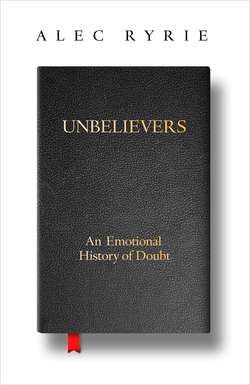Unbelievers: An Emotional History of Doubt

Реклама. ООО «ЛитРес», ИНН: 7719571260.
Оглавление
Alec Ryrie. Unbelievers: An Emotional History of Doubt
UNBELIEVERS
Alec Ryrie
Copyright
Dedication
Epigraph
Introduction
1. An Age of Suspicion
Impostors, Drunkards and Flat-Earthers
The Fool’s Heart
Physicians, ‘Naturians’ and ‘Nulla Fidians’
From Ancient to Modern
2. The Reformation and the Battle for Credulity
Calvin and the Epicures
Between Superstition and Impiety
‘Doubt Wisely’: From Innocence to Experience
3. The Atheist’s Comedy
Incest, Thunder and Wishful Thinking
Shaking Off the Yoke
The Good Atheist
4. The Puritan Atheist
‘The Monster of the Creation’
Horrid Temptations
Fear of Flying
5. Seeking and Losing Faith
‘It’s a Great Matter to Believe there is a God’
The Spiritualists’ Progress
Farther Up and Farther In
Seeking a Rock to Build On
6. The Abolition of God
The Three Impostors
From Then to Now, I: Anger
From Then to Now, II: Anxiety
From Jesus to Hitler
Acknowledgements
Notes. Introduction
1. An Age of Suspicion
2. The Reformation and the Battle for Credulity
3. The Atheist’s Comedy
4. The Puritan Atheist
5. Seeking and Losing Faith
6. The Abolition of God
Index
About the Author
Also by Alec Ryrie
About the Publisher
Отрывок из книги
An Emotional History of Doubt
Julian Barnes, The Sense of an Ending
.....
This was satirical fiction, the work of an author who was himself an ardent believer, and ought not to be taken too literally. Still, this much is plain. Physicians were the heirs to medieval Europe’s most robustly secular intellectual tradition. And while they might accept God’s role in human health and sickness, they could do nothing about it and so inevitably tended to ignore it. Whatever their own beliefs, their vocation led them to neglect God, and to do so at a moment when a patient might otherwise be rediscovering the urgency of faith.
So the physician’s consulting room can join the alehouse and gaming table on our list of secularised spaces. Since learned medicine was a tiny world, the preserve of a handful of university-educated doctors and those wealthy enough to be able to afford their services, this is perhaps not very important. Moreover, for all medieval and early modern medicine’s self-importance, it was very often useless and frequently worse, which did not increase its moral authority. Even the staunchest atheist might have been wiser to trust in God’s mercy than to submit to a medieval physician.
.....